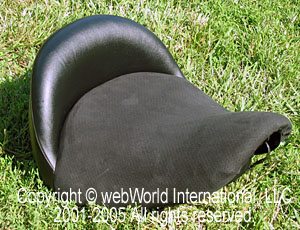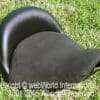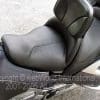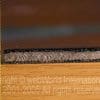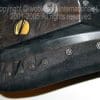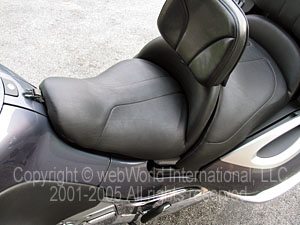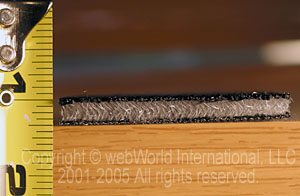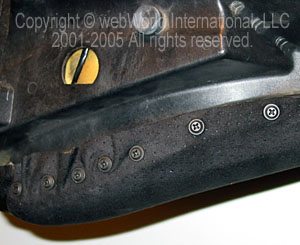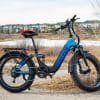As you may have discovered, the seat that felt fine on the motorcycle in the showroom isn’t quite so comfortable after several hours on the road.
Long distance riders and hard-core commuters know that an uncomfortable saddle can make for an unpleasant trip, if not sheer misery.
After having covered over 95,000 miles in 4 years on my 1999 BMW K1200LT, I had come to the conclusion that it was time to seriously look into a new seat for my bony butt.
At 6’3” and 160 pounds, I had a few complaints about the stock seat included on my Beemer.
Those included pressure in the groin area and heat buildup, especially during the summer months and after sitting for a couple of hours.
Also, I get a burning sensation on the pressure points where my butt bones (ischial tuberosities) press into the cushion.
Sure, I had visited some of the websites of the more commonly known companies that rebuild saddles.
But I just couldn’t bring myself to part with the dollars that would be required for a rebuild.
All of them were using either vinyl or leather, and it seemed to me that this wouldn’t resolve my complaint #2.
Leather and vinyl? I don’t think so.
My leathers get hot when the weather turns warm, and we all know how well vinyl breathes — or not, so I was hesitant to spend that much money and still have a sweaty backside.
Also, there was the issue of having to slip a rain cover over the leather seats because of the porous stitching. This sure seemed like an added nuisance to me.
But while cruising through the K1200LT website I came across something about a new company, KonTour in Arizona.
Ron Miller, who is a fellow K1200LT owner, is the proprietor, and a visit to their website had me very interested.
They are using entirely different products than any of the other motorcycle seat rebuilding companies I was familiar with.
Their methods and fabrics are claimed to promote airflow between the rider and the seat foundation.
KonTour would also be able to retain my heated seat which would be VITAL to keeping the Mrs. happy should I decide to have the passenger section done later.
Besides, I enjoy that heated seat myself on those chilly mornings before I have to switch over to the serious cold weather gear (if you don’t have heated seats you don’t know what you’re missing!).
KonTour says that they can add heat to most seats (for a price), something I’ve not seen many of the other re-builders mention. They also have all kinds of colors and patterns, available at an additional cost.
Their website includes a sampling of their available seats, options and prices.
I paid $475 for a rider’s seat rebuild, plus the shipping to and from AZ). Their price for a rebuild of a separate passenger seat is the same as for the rider’s.
KonTour Seat Options
They offer many different combinations of rebuild types and options, including their “Bakup” driver’s back rests.
An item of note is they accept personal checks, money orders or PayPal, but not credit cards.
So what’s different about KonTour seats?
It’s claimed to be a “patented, 6 layer, air cooled, infinitely adjustable, dampened, temperature regulated and breathable composite seat that utilizes the best characteristics of modern high tech materials and combines them to create the ultimate solution for motorcycle seat comfort”.
They also claim that the seats were designed by “a team of motorcycle test riders, a doctor, an automotive engineer, a commercial pilot and a human factors specialist to be the ultimate in comfort and luxury”.
The seats are recovered using 6 layers, from the outside in:
- A breathable cover
- Breathable mesh
- Waterproofing and radiant heat barrier
- Vibration isolation and energy management
- Dampening and ergonomics
- OEM foam core and vibration control
KonTour Seat Details
The outer layer is a 100% polyester micro-fiber perforated fabric that reminds me of fine suede with tiny holes. Nice and soft to the touch!
This allows air and water to pass through. This fabric is claimed to be “incredibly durable” and requires only a periodical gentle brushing with a medium bristle brush to clean.
Of course, covering the seat to protect it from the harmful rays of the sun, as with any material, will greatly extend the life. I always cover my bike to protect it from the sun.
The second layer is the breathable mesh (see photo, left). I took a close-up of this part because it’s quite unique — it looks like a thin sandwich made of tiny fibers on end between the two outer surfaces.
They compress when squeezed, but they spring right back when released. This layer is supposed to provide a channel for water to drain, moisture to dissipate and fresh air to circulate.
Layer three is an aluminized, rip stop, spun polyethylene fabric to provide water proofing for the padding, and it also blocks 70% of infrared radiant heat to help keep the seat cooler.
Cool — that means I don’t have to bother with a rain cover right? Not exactly, keep reading…
The fourth layer is a ½” thick piece of foam that’s made up of tiny spheres to help isolate and redistribute the pressure points.
Next is a 1” thick layer of military specification visco-elastic foam which is supposed to help respond to lower frequency vibrations and shock. This same material, they say, is used by NASA and in F-16 jets.
It’s also claimed to “provide a custom fit to your butt every time you mount your motorcycle….and… make changes in your seating position.”
The final (bottom) layer consists of the OEM foam that has been custom cut to allow room to build the rest of the seat, but still retain the original shape and size so as to provide for excellent fit and finish.
All of this is done on the stock seat pan as supplied by the owner.
Warranty and Installation
KonTour provides a lifetime warranty to the original owner if installed on a street bike. The warranty for a dual sport bike is 2 years or 24,000 miles. The warranty does not cover fading, which is pretty standard.
I made the decision last June to have KonTour rebuild just the rider’s seat on my LT. All contact is preferred via e-mail, which they were always very prompt in answering.
The only physical information they need is the weight and inseam of the rider and/or passenger (this could get some of us guys in trouble when you ask your SO their weight).
A couple of e-mails later Ron notified me they had an opening in their schedule coming up if I could get it to them the next week.
I quickly packed it up and off it went. Their stated time of turnaround is five days and true to their word, it was returned shortly after completion.
On inspection I found the workmanship to be very good with no loose ends.
The cover fit snug with no wrinkles or bunching.
The covering was attached to the underside of my stock seat pan by screws with fixed washers, unlike the stock seat which was attached with staples, glue and plastic rivets which are not reusable.
My seat shape was not changed. KonTour does not “dish” their seats.
They claim that “‘dishing’ a seat does create more surface area, but is a very small factor in creating a comfortable seat”.
To say I was excited to try it out would be an understatement!
Most saddles require a “break-in” period, but the KonTour does not. It’s supposed to conform to your anatomy in about 30 minutes.
The first time I tried it, I found it to be much firmer than the stock seat and very firm to hard when cold.
It softens up with body heat and in cold weather they advise the owner to turn on the seat heater (if installed) for a minute or two to speed up the softening process.
I waited until I had put some miles on the seat before I wrote this review, because I wanted to have a better overall opinion of its performance.
Riding With A KonTour Seat
My “seat of the pants” (pun intended!) testing was very thorough, and included daily commuting through the summer and fall, consisting of a 100 mile per day, round-trip of about 50% slab and 50% back roads.
I also went on some weekend outings and a two-up, two week road trip in September that covered 5,500 miles.
The temperatures included from a low of 32 degrees F with snow in Yellowstone, Wyoming to 103 hot and humid degrees F here in the Baltimore-Washington area. My longest day was 775 miles in 80 degree temps. So far I have about 13,000 miles on the seat and now feel I can report on my findings.
So, how does it “feel”? Well, the pressure in my groin is still there. But my posterior does not get as hot as before. This also means it is cooler when the ambient temperatures drop.
Not a problem for those with heated seats, but could be if you don’t have one.
Finally, I still get the burning sensation after a while in the seat, but it does take longer to arrive, and it still has me squirming after a couple of hours.
All told, this is not as much of an improvement as I had hoped. By the way, about that rain thing: It seems the water does run off the third layer, but the upper layers will retain water.
The way I found this out was after a summer shower rolled through during the middle of the day at work and I didn’t bother to cover the seat.
The seat is supposed to shed water and it would be several hours before I’d be heading home.
The seat didn’t look wet, but it sure was when I headed home and so were my pants shortly after sitting down.
The way to prevent this is first to make sure the seat is covered with something like a plastic bag. If not, it’s important to either blot the seat with a towel or stand the seat up vertically to let it drain.
I now keep a medium sized trash bag in the side case and it slip over the seat if it looks like it’s going to rain or have a heavy dew in the morning.
Conclusions
I’m pleased with the workmanship, fit and finish, but a bit disappointed with the performance of the seat in addressing my concerns in comfort.
I had hoped to be able to put in longer days without the discomfort that I had with the stock BMW “comfort” seat.
Maybe it’s me, but I have logged lots of miles on the stock seat and I can offer a very good comparison. I was surprised to find the same levels of discomfort at about the same point with the KonTour seat.
Comfort is such a personal thing, what one person finds to be very comfortable another may not.
I have no plans to compete in the Iron Butt Rally, but if I did, my rump wouldn’t make it to the end of the first 1,000+ mile day.
However, your results may be different and a KonTour seat may help you keep slightly cooler in hot weather.
| wBW Review: KonTour Custom Motorcycle Seat | |
|---|---|
| Manufacturer: KonTour Seat | List Price (2005): $475.00 and up |
| Colors: Varied | Made In: U.S.A. |
| Review Date: December 2005 | |
Owner Comments and Feedback
See details on submitting comments.


